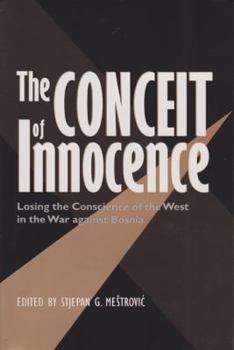The Conceit of Innocence: Losing the Conscience of the West in the War Against Bosnia
(Part of the Eugenia & Hugh M. Stewart '26 Series Series and Eugenia & Hugh M. Stewart '26 Series Series)
Innocence may be lost in the post-Cold War West, but the imitation of innocence is evident in the social and political landscape of the 1990s. Eminent sociologist David Reisman has argued that the current culture attempts to imitate a purity of action, motive, and spirit commonly associated with the 1950s: faith in government, optimism concerning the future, and a can-do social and political attitude. These essays by prominent scholars and former policy makers carry forward Reisman's assertions in exposing the pretense in supposedly moral-driven Western policy, especially as it pertains to the crisis in Bosnia. In his introduction to The Conceit of Innocence , Stjepan Mestrovic shows how the theory of imitation--or conceit--flows out of Reisman's and his own previous works and acts as the theme that binds the essays of the contributing authors. Renowned anthropologist Akbar Ahmed discusses the existence of "ethnic cleansing" in the face of Western assertions that ethnic-based hatreds largely have been overcome. In his two essays, Richard Johnson shows the hypocrisy in the U.S. State Department's reaction to the genocide in Bosnia and demonstrates how the West--even as it pretends to expand NATO and enforce security and democratic principles--has begun to appease Russian expansionism as it had appeased Serbian aggression. Syndicated columnist Georgie Anne Geyer furthers this theme by exposing how the White House, the UN secretary-general, and a host of others pretend to follow resolutely the UN Charter while at the same time appeasing genocidal aggression. Keith Doubt reveals how the West attempts to "save face" and "give face" to Slobodan Milosevic, the man widely held to be responsible for starting the Bosnian War. Slaven Letica further unveils hypocrisy in examining the many international war criminals who have been lionized in the West. Brad Blitz finds Western universities to be dangerously duplicitous in their response to a moral crisis. Albert Wohlstetter removes the mask of Lincoln, placed on Boris Yeltsin by Western opinion makers, to reveal true Russian foreign policy motives. Chandler Rosenberger exposes the false innocence of Serbian mythology. And finally, Stephen W. Walker and Marshall Freeman Harris, the two former State Department officials who resigned their posts in protest over the Clinton administration's handling of Bosnia, dissect the U.S. peace plan, concluding that what pretends to be American moral leadership really follows in the wake of European appeasement. Interpreting the 1990s sociopolitical text crafted by spin and driven by hidden motive, these essays are at the vanguard of a cultural theory that is responding to the here and now. Sociologists, historians, and other interested in the Bosnian War and its global ramifications will find this book to be an invaluable contribution to a growing literature.
Format:Hardcover
Language:English
ISBN:0890967709
ISBN13:9780890967706
Release Date:October 1997
Publisher:Texas A&M University Press
Length:256 Pages
Weight:1.30 lbs.
Dimensions:1.0" x 6.3" x 9.3"
Customer Reviews
1 rating
Excellently exposes the pretence of post-Cold War morality
Published by Thriftbooks.com User , 26 years ago
The book is an excellent examination of the philosophical and psycho-social issues that the West now has to grapple with due to its (im)moral mishandling of the Bosnian crisis. Far from being a diatribe which serves the propaganda interests of any side, the authors explore the multiple implications that have arisen due to the loss of Western morality (or perhaps, the sham that was the West's previous pretence to morality) from various angles, and discuss not only what this means for the Bosnian themselves, but also its importance for today's Western societies.





